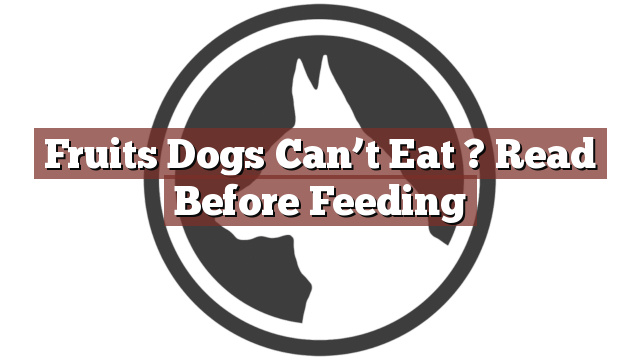Understanding Your Dog’s Dietary Needs
As a responsible dog owner, it is crucial to understand and meet your furry friend’s dietary needs. While dogs are primarily carnivores, they do enjoy the occasional treat of fruits and vegetables. However, it is essential to remember that not all fruits are safe for dogs to consume. Certain fruits can pose health risks and should be avoided altogether. So, before you offer your canine companion a fruity snack, it’s important to know which fruits dogs can’t eat.
Fruits Dogs Can’t Eat? Read Before Feeding
The list of fruits that are potentially harmful to dogs includes some surprising ones. It’s vital to educate yourself on these fruits and avoid feeding them to your four-legged friend. Can dogs eat grapes? No, dogs should not consume grapes or raisins, as they can cause kidney failure. Can dogs eat cherries? No, cherries are a no-no as well because they contain toxic compounds that can be harmful to dogs. Can dogs eat avocados? The answer is also no, as avocados contain persin, a substance that can be toxic to dogs.
Another fruit to avoid is citrus fruits, such as oranges, lemons, and limes. While small amounts might not cause any harm, the high acidity of these fruits can upset a dog’s stomach and potentially lead to gastrointestinal issues. Lastly, it’s crucial to keep your furry friend away from fruits with pits, like peaches, plums, and apricots. The pits can pose a choking hazard and also contain small amounts of cyanide, which is toxic to dogs.
Pros and Cons of Feeding Fruits to Dogs
Now that we have covered the fruits that dogs should avoid, let’s discuss the pros and cons of feeding fruits to dogs. Incorporating certain fruits into your dog’s diet can offer various health benefits. For example, fruits like apples and strawberries are rich in vitamins and antioxidants, which can support your dog’s immune system and overall well-being.
However, it’s essential to remember that fruits should only make up a small portion of your dog’s diet. While fruits are a healthy addition, they should not replace the essential nutrients found in a balanced dog food. Additionally, some fruits, like bananas and melons, are high in natural sugars and can contribute to weight gain if given in excess.
In Conclusion: Making Informed Choices for Your Dog’s Well-being
Feeding your dog a balanced diet is crucial for their overall health and well-being. While fruits can be a tasty and nutritious addition to your dog’s diet, it is essential to be aware of the fruits dogs can’t eat. Grapes, cherries, avocados, citrus fruits, and fruits with pits should be avoided due to potential health risks.
When incorporating fruits into your dog’s diet, it’s important to do so in moderation. Always consult with your veterinarian before introducing new foods to your dog’s diet, especially if they have any pre-existing health conditions. By making informed choices about what fruits are safe for your dog, you can ensure their diet remains healthy and balanced.
Thank you for taking the time to read through our exploration of [page_title]. As every dog lover knows, our furry friends have unique dietary needs and responses, often varying from one canine to another. This is why it's paramount to approach any changes in their diet with caution and knowledge.
Before introducing any new treats or making alterations to your dog's diet based on our insights, it's crucial to consult with a veterinarian about [page_title]. Their expertise ensures that the choices you make are well-suited to your particular pet's health and well-being.
Even seemingly harmless foods can sometimes lead to allergic reactions or digestive issues, which is why monitoring your dog after introducing any new food item is essential.
The content provided here on [page_title] is crafted with care, thorough research, and a genuine love for dogs. Nevertheless, it serves as a general guideline and should not be considered a substitute for professional veterinary advice.
Always prioritize the expert insights of your veterinarian, and remember that the health and happiness of your furry companion come first.
May your journey with your pet continue to be filled with joy, love, and safe culinary adventures. Happy reading, and even happier snacking for your canine friend!

